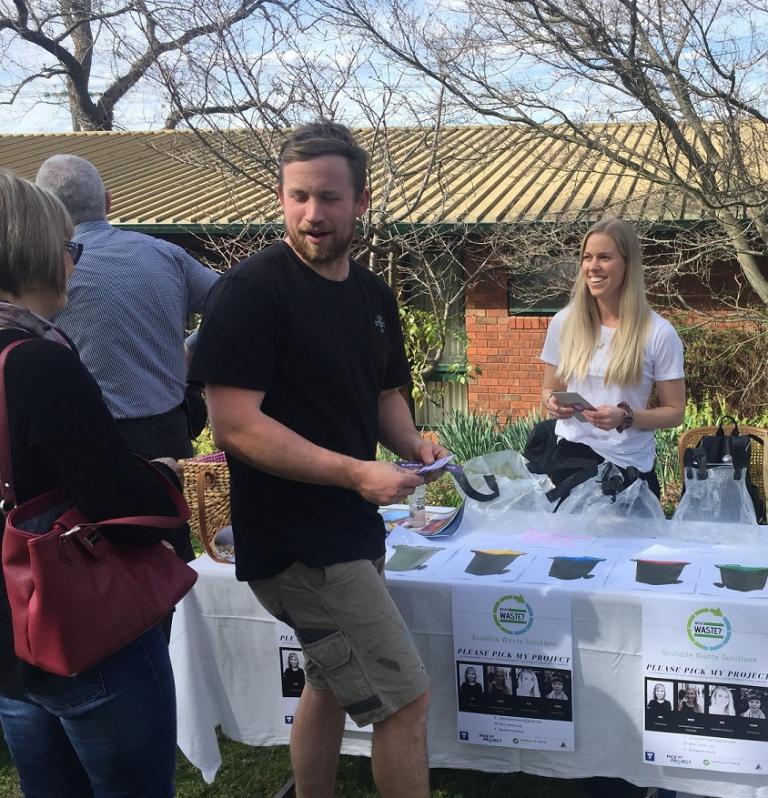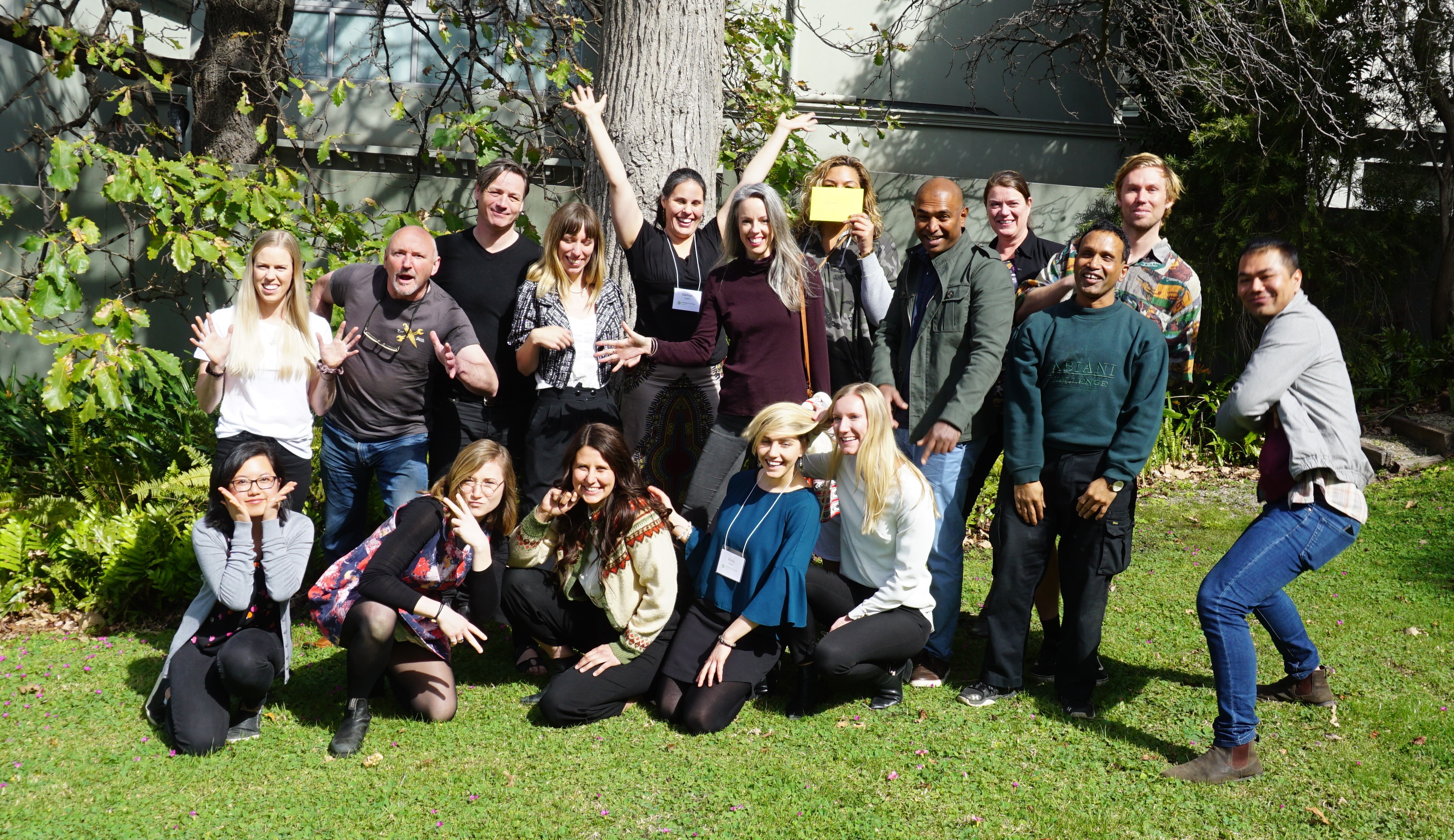Participants in the 2018 cycle of the Sustainable Impact Mentoring (SIM) program presented their projects on 8 September at Armagh, and reflected on the program’s Human-Centred Design approach.
Alice, Jacinta and Julianne came to SIM through their common interest in sustainability. Their initial project plan, dubbed ‘Greenleaves,’ intended to take corporate workers to the country on camping trips, tapping into companies’ corporate wellness funds. But potential clients were skeptical.
‘The same pain point came up again and again - the lack of time and ability to go to what people perceived as nature,’ said Jacinta. The group ran a survey that asked people ‘What is nature?’ From this, they learned that people felt relaxed and less stressed when they spent time amongst greenery, and most described nature as a space full of plants and animals.
‘We struggled with how to fit all these into our project,’ said Alice. ‘At first we were sure that we could only achieve this by bringing people outside.’
Then Marion, one of the group’s mentors, offered them a working space in a drab, windowless room at RMIT. The friends began to experiment with the idea of bringing nature indoors, working in partnership with plant nurseries. ‘The experience taught us to prototype as much as possible,’ said Alice. ‘We learned the importance of appealing to all the senses to build an effective and immersive experience, using lighting and the subtle sounds of nature.’
The result – presented at a pop-up experience at Armagh on 8 September – is the creation of a full sensory experience. Sinking into the comfy chairs, a leaf brushes your face. The light filters through greenness, and creepers run across a screen. Not only the sights but also the sounds and smells of being outdoors are there.
The group ran a trial event, ‘Brain Forest @RMIT’, which showed, to their pleasant surprise, that students and visitors benefited from being in this space. The Brain Forest has now been booked in at Melbourne Uni Peace Builders Conference and the Practically Green Festival in Eltham. The group is seeking to partner with organizations that would like to feature The Brain Forest at their workplaces.
Human-Centred Design Approach
The experience of the Brain Forest team highlighted many special features of the SIM program.
Over a seven-month period, participants and their mentors attend monthly workshops and clarify their plans through a Human-Centred Design (HCD) approach that incorporates elements of complexity thinking, principles of self-organization, and a ‘technology’ of participation. The approach emphasizes immersing oneself in the issue and understanding the true needs of the intended beneficiaries – even at the risk of not completing one’s intended project.
One participant compared the experience to a quote often attributed to Einstein: ‘If I had an hour to solve a problem, I would spend 55 minutes thinking about the problem and five minutes solving it.’
SIM program coordinator Kirsty Argento reflected on moments of tension that seemed to arise out of the program methodology. ‘In our culture of productivity we make many assumptions because we are eager to jump to solutions, making it hard for us to face the realization that, in the end, our solutions may not be quite right,’ she said. ‘We need to avoid “solution seduction”.‘
Each of the proposed group projects, she observed, grew stronger through the research and design process.
Avoiding solution seduction

Sam and Tushan, created Acid Dingo Bike Trips, a service offering mountain bike tours to the public. The Acid Dingo duo initially aimed to develop a program for youth at risk, running tours to Sam’s bush block at Mount Beauty, Victoria, that would help young people experience the mental health benefits of connecting with nature. Through the mentoring and design process, they decided to first trial one element of the plan - a service offering bike tours to the public to increase awareness of the natural environment Melbourne has to offer and to decrease the anxiety that comes with city lifestyles. Tushan developed a downloadable app for bookings, while Sam took friends and colleagues on tours to test the suitability of the routes and his approach as their tour guide, fitting out his van along the way for the electric bike trips along the Yarra and Merri Creek.
Alex, Kate, Hayley and Sharon developed the ‘What Waste’ platform for sharing knowledge and experiences in waste management. The team’s initial survey of 61 people revealed that more than half their respondents said they did not know or were unsure what local councils are doing to combat waste, or believed it was ‘not enough.’ Their research also found many relevant projects and businesses, such as the community composting project ShareWaste, Red Cycle, which deals with plastic waste, and Terracycle, which specializes in hard-to-recycle waste. The four friends kept creating project ideas only to dig a little and find it was already being done somewhere else!

They concluded that a common platform could help build a community around existing waste management efforts that would enable local communities and municipal councils to replicate and upscale solutions instead of reinventing the wheel. Such a platform would operate not only in the online space but also through workshops and showcases that bring people together. Their project has been featured on the Victorian government’s ‘Pick My Project’ community site, where they stand a chance to win a grant to help turn their plan into action. – Delia Paul
For more information about SIM, contact us on 9822 1218 or at info.au@iofc.org
To express interest in the 2019 SIM program, please fill out your details via this link.

